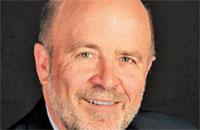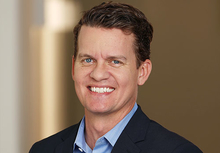"Absolutely that was the right decision for us, because we now have a world-class lineup of a full family of vehicles that we can manufacture and distribute in various parts of the world."
DETROIT -- Strong demand for SUVs and pickups has generated big profits for Ford Motor Co. But Ford's outlook for the industry took a negative turn in July, as the automaker warned of looming risks to its financial goals.
Amid skepticism on Wall Street, CEO Mark Fields aims to prove that Ford is in much better shape to withstand a downturn in the market. He's also working to prepare the automaker for a future in shared and autonomous vehicles by adding mobility services to its portfolio. And for more than a year, he has had to defend the company against continual attacks from Republican presidential candidate Donald Trump, who has criticized plans to move small-car production from Michigan to Mexico.
Fields, 55, spoke with Staff Reporter Nick Bunkley, News Editor Dave Guilford, Publisher and Editor Jason Stein and TV Reporter China Haley of Automotive News Europe sister publication Automotive News at Ford's headquarters last week.
Q: You were an outlier when you came out after the second quarter with such a negative outlook. Why?
A: You always have to look at the business environment. You need to be able to interpret the outside world and what it means for your business. We'll just continue to look at the facts and react very proactively. The way we run the company, we're all sitting around a table every Thursday morning looking at these things. It allows us to be very proactive as opposed to reactive. Against a backdrop of it's still a very healthy industry by historical standards, but there are stresses in it and we're getting ahead of that.
Is the industry controlling production and supply without crazy price cutting?
When you look at the amount of capacity that was taken out during the Great Recession, a lot of the industry is operating at a higher capacity utilization, including ourselves. But at the same time, when you combine that with more flexible union contracts, it allows you to adjust to the market more appropriately, and we're doing that. We're always following our strategy of matching production with demand. So we took a week of downtime at Flat Rock because we want to make sure that, as some of our competitors are out spending a lot more money than us, we're managing the business appropriately. From a production standpoint, if we see that it's temporary, we can do things like we did last week -- take a down week, take out overtime, maybe slow some line speeds. If it's more pronounced, you take shift adjustments, but we're not there.
Is the industry acting in a rational way?
It depends on the competitor, and it depends on the month. All you've got to do is look at last month and some of the things that were in the marketplace. I can't speak for our competitors, but it all depends on different motivations. The auto industry benefitted disproportionately in the early part after the recession than the rest of the general economy. Part of it was pent-up demand. Now as demand is flattening, you're seeing competitive pressures become greater. You will see more erratic SAARs on a month-to-month basis. Part of that is various competitors at various times are going to do what they feel is necessary to run their business.
We manage to profitability, not to market share. We want to be profitable, we want to make sure our dealers stay profitable and healthy, and that's the way we're going to run our business -- be very consistent.
Ford's retail share is down a couple of 10ths. Do you need to do anything differently?
Our total share is up a 10th so far this year in North America. Our retail share is down a few 10ths. Part of that has to do with the car side of the business. We've said we'll focus on some of the segments where customers are migrating towards, whether it's SUVs or pickup trucks, and we're doing nicely there.
So are you basically letting the car side of your business settle to a more natural level?
We're always market-driven, we always have to be customer-centric and see where the customers are going. Clearly we want to keep our dealers competitive in the marketplace, but at the same time it has to have a strong eye toward what's going on in the marketplace and not try to push the market unnaturally where it otherwise won't go.
In 2008, your small-car strategy was a pillar of your plan here. Nobody saw gas prices falling the way that they have. What is Ford's small-car strategy knowing what you know now?
When you look at the car market in general, those segments are still pretty large. They're down from where they've been. The midsize car segment's been consistent the last couple months at 11.5 percent; that's still one of the largest segments. Same thing for compact cars where our Focus participates in. So you're going to see us keep our product fresh in those markets, because you never know where consumer demand is going to go. We get questions of "Oh, why don't you just get out of the car business?' It's important that we have a full lineup of vehicles, because you never know what's going to happen with the economy with regulations, with customer preferences, and we want to be there for customers wherever they go. We'll keep our car lineup very fresh.
Does it surprise you how dramatic the shift has been to SUVs?
It's pretty significant. I think it's pretty unprecedented. At the same time, what's been unprecedented is some of the external changes: gas prices, interest rates, etc. The lesson there is just as things can move that way, they can move back the other way as well. There's that old saying: "Everything reverts to the mean.' Now, I'm not saying customers always revert to the mean, but you never know. I was with a bunch of young folks the other weekend and they were singing the praises of, believe it or not, station wagons.
On your goal of a Level 4 self-driving car by 2021, how do you get from here to there in that time?
First off, you get alignment around the rallying cry that you're shooting for. Our intent is to have a vehicle out in 2021. We've been developing autonomous vehicles for over 10 years now. We've had a lot of experience obviously in developing driver assist features -- Level 1, Level 2. From our standpoint, going to Level 4 was important because with Level 3, how do you responsibly hand off or re-engage the driver in a timely manner? We're going to be working very hard to meet that 2021 deadline that we've set for ourselves. We have a great team and a great set of partners.
Are you confident that the technology will be there?
We think the technology is coming along really well. There's a lot of testing still to be done. When you look at getting an autonomous vehicle into the marketplace, there are always risks. But we think we're well positioned. When you look at the risks -- risks around technology, risks around regulation, risks around economics, and finally customer adoption -- we think we're well positioned on those things.
How long will it be until profits from mobility services make up a significant part of Ford Motor Co.?
You see some elements rolling out -- our purchase of Chariot, the dynamic shuttle company in San Francisco; we'll be rolling that out in six cities over the next 18 months. We're targeting at least 20 percent returns on the services side of it, and we already get that from some services businesses we have today, but it will be a while before it becomes a significant portion of our business. That's why we're thinking through very clearly where do we want to play and how we think we will win in these areas, because we have to be really intellectually honest with ourselves by asking what are we bringing to the party that for others would be hard to duplicate.
We're thinking through this very deliberately to make sure it makes sense for us and fills a need for the consumer.













